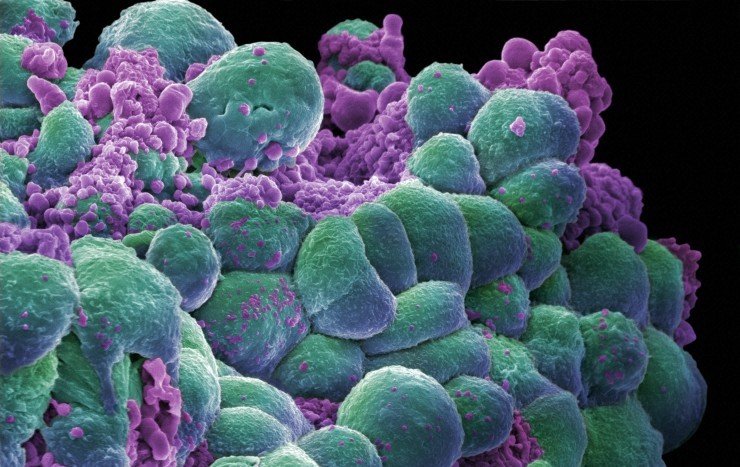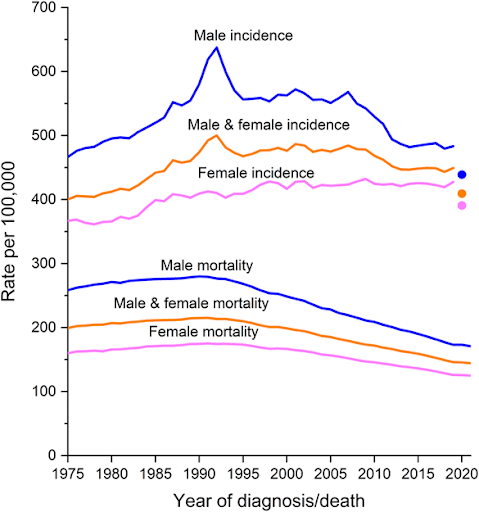
Claims questioning COVID-19 vaccine safety have circulated continuously since COVID-19 vaccination campaigns began at the end of 2020.
One such claim suggests that there has been an unprecedented rise in the number of cancer cases after the COVID-19 vaccine rollout, implying that the vaccines are responsible for this phenomenon. Science Feedback previously explained why this claim was unsubstantiated.
This claim occasionally relies on anecdotal evidence, such as accounts from health practitioners. However, anecdotal evidence alone isn’t enough to support a scientific hypothesis. Anecdotes can’t confirm whether there has been a nationwide increase in cancer cases.
A better approach would be to look at national cancer statistics gathered by public health agencies and research organizations. When doing so, readers may come across headlines that seem to support the claims, at least at first glance.
Indeed, the World Health Organization (WHO) expects a 77% increase in world cancer cases by 2050 and the American Cancer Society (ACS) estimates the number of new U.S. cancer cases to hit a record high of two million in 2024. Furthermore, news outlets have also reported an unexpected increase of cancer incidence among younger adults, although the cause of this phenomenon, which started before the COVID-19 pandemic, remains elusive.
However, simply because these predicted increases occurred after COVID-19 vaccines were rolled out doesn’t in itself prove that the vaccines were the cause. This article aims to provide insight on this matter and explain why there is no plausible link between COVID-19 vaccines and cancer.
What does the U.S. cancer forecast for 2024 say?
Each year, the American Cancer Society (ACS) provides a report on cancer burden in the U.S. This report uses cancer data from official nationwide databases to forecast the expected number of new cancer cases and deaths for the year to come.
The latest ACS report was published in January 2024. It predicted that new cancer cases would reach two million in 2024 for the first time[1]. This increase was attributed in part to “the aging and growth of the population and by a rise in diagnoses of 6 of the 10 most common cancers”.
Although the ACS predicted a record high number of new cancer diagnoses in 2024, their analysis also found that cancer incidence has actually fallen over time, as seen in Figure 1 below. This difference can be explained by the fact that, unlike the raw number of cancer cases reported each year, the incidence accounts for changes in population size and age structure over time. Therefore, it is better suited for yearly comparisons.

Figure 1 – Trends in cancer incidence and mortality. The incidence is corrected for changes in the U.S. population demographics over the years and is expressed in cases per 100,000 people. Source: The American Cancer Society.
Thus, in spite of the projected increase in the raw number of cancer cases in years to come, the decreasing incidence indicates that the cancer burden on the overall population is expected to be lower than in the previous years.
Does the rise in the number of cancer cases have to do with COVID-19 vaccines?
Although the latest ACS report provided an informative overview of the current cancer trends in the U.S., it’s unable to tell us whether there’s actually been a sudden increase in cancer cases since the COVID-19 vaccine rollout.
This is because the forecast is based on data from public cancer databases only up to the year 2020. The reason for this is that it takes time to collect data from local healthcare practitioners, verify the accuracy of the information, and consolidate the data into databases. As the ACS report explains:
“The most recent year for which incidence and mortality data are available lags 2–4 years behind the current year because of the time required for data collection, compilation, quality control, and dissemination.”
In other words, this forecast can only extrapolate to the recent years historical trends that were already happening prior to 2020. Thus, any changes in cancer cases due to unexpected events occurring from 2021 onward and not resulting from historical trends would not be captured by this model.
Therefore, the verified data available at the national level is affected by the uncertainty surrounding the forecast. It isn’t suited to support the claim that cancer diagnoses actually spiked.
Even if cancer cases have actually risen post-COVID vaccination, this alone still isn’t bulletproof evidence that the vaccines are responsible for the rise. People and healthcare systems experienced significant upheaval during the pandemic that could have influenced the number of new cancer diagnoses in 2024, independent of vaccination.
For instance, there was a sudden reduction in cancer care in 2020 owing to the impact of the COVID-19 pandemic, which led to delays or missed preventive screenings for cancer. This may result in an uptick in new cancer diagnoses in recent years, since people can now get screened for cancer more easily once again.
Commenting on the issue, Lisa Richardson, the director of the CDC’s Division of Cancer Prevention and Control, told CNN:
“What we might see is that there are actually more cases of cancer, because people caught up. But it’s not truly an increase. It’s just a catch up of what was there that we didn’t diagnose during 2020.”
In their news story accompanying the release of the 2024 report, the ACS also explained:
“Researchers have not yet analyzed the potentially myriad ways in which the pandemic affected these cancer statistics. When data is available, researchers expect that the public health crisis of COVID-19 will be found to have delayed diagnoses and led to worse outcomes and more deaths. But it will take many years to parse out those effects.”
Still, data from other sources appear to offer some reassurance. Arif Kamal, the chief patient officer for the American Cancer Society, told the Associated Press that state-level surveillance systems are able to rapidly detect unexpected increases in cancer diagnoses. Even so, none detected abnormal rates of increased cancer cases.
In short, nationwide data available to date isn’t suitable to support the claim that we’ve seen a sudden spike in cancer cases since the rollout of COVID-19 vaccination. Further, local cancer monitoring systems haven’t detected such a spike, according to an ACS expert. It’s therefore unlikely that an unexpected spike in cancer cases will appear in future years, when the data for 2021 to 2024 is consolidated in the national databases.
Moreover, even if there was an increase in cancer cases, this still wouldn’t mean that COVID-19 vaccines were responsible for it. Delays and missed cancer screening tests, a consequence of the pandemic, may also cause a delayed detection of new cancer cases.
No plausible link between COVID-19 vaccines and cancer
We have thus far explained that there was no data available to date supporting the claim that cancer cases surged after COVID-19 vaccines were rolled out. But another reason why this claim isn’t credible is because there’s no plausible scientific mechanism explaining how COVID-19 vaccines cause cancer.
Science Feedback and others have explained that there’s no evidence that COVID-19 vaccines may cause cancer, according to medical experts.
Victoria Chou, a maternal and child health epidemiologist at Johns Hopkins University, told USA Today that “[t]here is no evidence to suggest that the COVID-19 vaccine in any way causes cancer”.
Likewise, the U.S. National Cancer Institute states that “there is no evidence that COVID-19 vaccines cause cancer, lead to recurrence, or lead to disease progression”. Claims to the contrary commonly rely on flawed analysis or unverified statements.
Some claims suggested that small DNA fragments present in COVID-19 mRNA vaccines as a possible mechanism through which the vaccines could cause cancer. But this claim is unsupported by scientific evidence, as Science Feedback previously explained.
In particular, the presence of DNA derived from the simian virus 40 (SV40) was reported in the Pfizer COVID-19 vaccine. The SV40 virus has been found to cause cancer in some animals like hamsters[2,3]. It also caused a health scare when it was found to contaminate polio vaccines used in the 1950s and 1960s.
However, there’s no evidence that SV40 increases the risk of cancer in humans, as we explained in a previous claim review. Furthermore, the vaccine vials that were analyzed only contained fragments of one segment of the SV40 DNA—not the virus itself or its full genetic sequence, which makes the risk of an interaction with our genome even less plausible.
Moreover, the amount of residual DNA detected in the vaccine vials is well below the limit recommended by the WHO and the U.S. Food and Drug Administration (FDA), as Science Feedback showed.
Finally, there is no scientific evidence or plausible mechanism suggesting that these DNA fragments would change our DNA and cause cancer.
Conclusion
The latest report from the ACS predicted a rise in the number of cancer cases in the U.S. for 2024, which can be attributed in part to changes in the size and age structure of the U.S. population.
However, it’s important to be aware that these are predictions based on cancer cases in pre-pandemic years. Since it takes several years to gather, verify, and consolidate cancer data at the national level, there’s no real-time way to monitor national cancer trends. Medical experts have also explained that there is no plausible mechanism or data that connect COVID-19 vaccines to cancer.
REFERENCE
- 1 – Siegel et al. (2024) Cancer statistics, 2024. CA: a cancer journal for clinicians.
- 2 – Girardi et al. (1962) Development of Tumors in Hamsters Inoculated in the Neonatal Period with Vacuolating Virus, SV40. Experimental biology and medicine.
- 3 – Cicala et al. (1993) SV40 induces mesotheliomas in hamsters. American journal of pathology.
